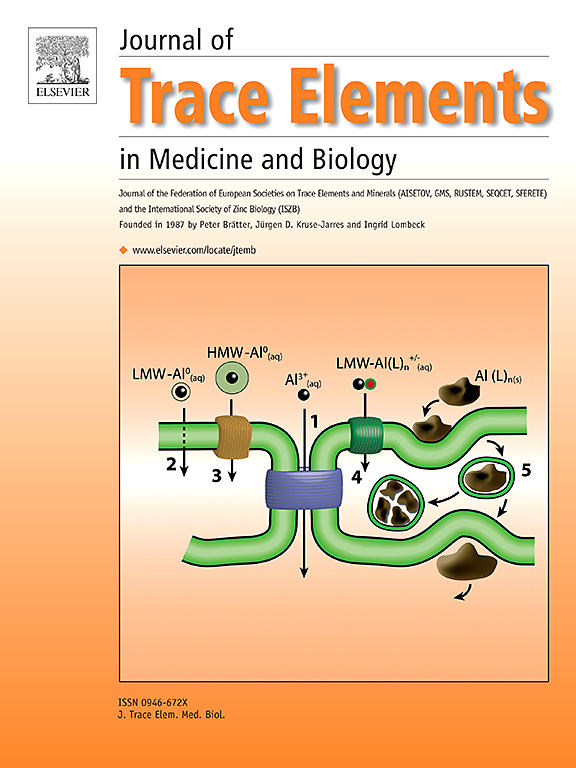Association between maternal serum zinc and birth weight is modified by neonatal SOD2 polymorphism and promoter methylation
IF 3.6
3区 医学
Q2 BIOCHEMISTRY & MOLECULAR BIOLOGY
Journal of Trace Elements in Medicine and Biology
Pub Date : 2025-02-01
DOI:10.1016/j.jtemb.2025.127595
引用次数: 0
Abstract
Background
Conflicting findings exist regarding the association between maternal serum zinc and neonatal birth weight. This study aimed to explore the association between maternal serum zinc and birth weight, and whether this association was modified by neonatal SOD2 polymorphism and promoter methylation.
Methods
We recruited 464 mother-newborn pairs at Houzhai Center Hospital from January 2010 to January 2012. Maternal serum zinc concentration was determined using atomic absorption spectrophotometry. Neonatal SOD2 polymorphism and promoter methylation were measured by TaqMan probe assay and real-time quantitative methylation-specific PCR (QMSP), respectively. Relationships among maternal serum zinc, neonatal SOD2 promoter methylation, and birth weight were analyzed by generalized linear model (GLM). Stratified and interaction analyses were conducted to explore the modification of neonatal SOD2 polymorphism and promoter methylation on the association between maternal serum zinc and birth weight.
Results
Our findings revealed that higher maternal zinc concentrations were associated with decreased birth weight (P-trend < 0.05). Each 1 μmol/L increment in maternal zinc level was associated with a 9.553 g (95 % CI: −16.370, −2.735) decrease in birth weight. A significant interaction between SOD2 promoter methylation and maternal serum zinc in relation to birth weight was observed in the AG+GG group (P-interaction < 0.05). Newborns carrying AA genotype were more sensitive to maternal serum zinc in the lower SOD2 group (P-interaction < 0.05).
Conclusions
Maternal serum zinc was inversely associated with birth weight, and this association was modified by neonatal SOD2 polymorphism and promoter methylation. These findings suggest that SOD2 polymorphism and promoter methylation may influence the relationship between maternal zinc status and fetal growth.
新生儿SOD2多态性和启动子甲基化修饰了母亲血清锌与出生体重的关系。
背景:关于母亲血清锌和新生儿出生体重之间的关系存在矛盾的发现。本研究旨在探讨母亲血清锌与出生体重之间的关系,以及这种关系是否受到新生儿SOD2多态性和启动子甲基化的影响。方法:2010年1月至2012年1月在后寨中心医院招募464对母婴。采用原子吸收分光光度法测定孕妇血清锌浓度。采用TaqMan探针法和实时定量甲基化特异性PCR (QMSP)检测新生儿SOD2多态性和启动子甲基化。采用广义线性模型(GLM)分析孕妇血清锌、新生儿SOD2启动子甲基化与出生体重的关系。通过分层分析和相互作用分析,探讨新生儿SOD2多态性和启动子甲基化对母亲血清锌与出生体重关系的影响。结果:我们的研究结果显示,较高的母亲锌浓度与出生体重下降有关(p趋势< 0.05)。母体锌水平每增加1 μmol/L,新生儿出生体重减少9.553 g(95 % CI: -16.370, -2.735)。AG+GG组SOD2启动子甲基化与母亲出生体重相关的血清锌存在显著交互作用(p交互作用< 0.05)。低SOD2组AA基因型新生儿对母亲血清锌更敏感(p交互作用< 0.05)。结论:母亲血清锌与出生体重呈负相关,这种关系被新生儿SOD2多态性和启动子甲基化修饰。这些结果表明,SOD2多态性和启动子甲基化可能影响母体锌水平与胎儿生长的关系。
本文章由计算机程序翻译,如有差异,请以英文原文为准。
求助全文
约1分钟内获得全文
求助全文
来源期刊
CiteScore
6.60
自引率
2.90%
发文量
202
审稿时长
85 days
期刊介绍:
The journal provides the reader with a thorough description of theoretical and applied aspects of trace elements in medicine and biology and is devoted to the advancement of scientific knowledge about trace elements and trace element species. Trace elements play essential roles in the maintenance of physiological processes. During the last decades there has been a great deal of scientific investigation about the function and binding of trace elements. The Journal of Trace Elements in Medicine and Biology focuses on the description and dissemination of scientific results concerning the role of trace elements with respect to their mode of action in health and disease and nutritional importance. Progress in the knowledge of the biological role of trace elements depends, however, on advances in trace elements chemistry. Thus the Journal of Trace Elements in Medicine and Biology will include only those papers that base their results on proven analytical methods.
Also, we only publish those articles in which the quality assurance regarding the execution of experiments and achievement of results is guaranteed.

 求助内容:
求助内容: 应助结果提醒方式:
应助结果提醒方式:


